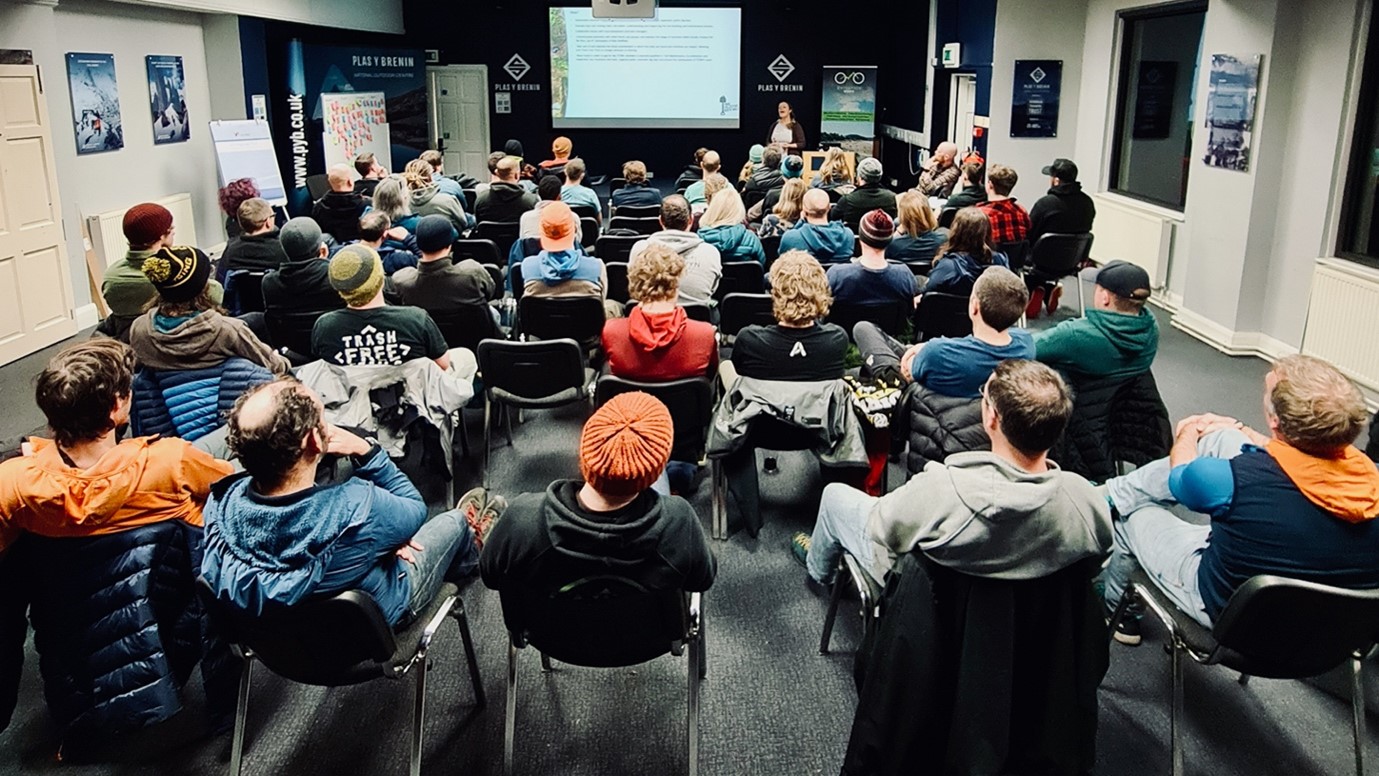
That night it was pitch black and very wet. Driving to Plas y Brenin -National Outdoor Centre (PYB) was pretty treacherous. The rain, however, didn’t stop a plethora of local and not-so-local biking communities from showing up to get an insight into the vision proposed by Trail Collective North Wales. Most riders took to their seats, some stood at the back. You could feel there was a slight tension in the room. Unfazed by the number of talented riders and builders in the audience, Kath, Chair, eloquently began the meeting with a few words that drew everyone’s attention.
What is the Trail Collective, why was it set up, and what is its purpose? In general terms, Kath explained that the collective’s intentions are to piggyback an idea that was originally envisioned many years ago by local trail builders.
This was to organise a cooperative of like-minded riders and builders of ‘wild’ trails. You could feel in Kath’s voice that determining an open communication channel with the landowners/stakeholders and resolving issues around insurance and liability had been a massive headache.
Taking insights from successful trail organisations in other areas of the country and meeting with sports bodies, local government, and National Resource Wales (NRW) leading up to this event had been stressful and somewhat rewarding in the same breath.
Some progress had been made, but a sticking point, yet to be resolved, was the cooperation from key local forestry personnel. This could only move forward with a signed-off formal trail management plan in place.
With the recent surge of interest in off-road cycling and the accessibility to social media and apps like Strava and Trailforks, secret trails once built by and for local riders were now the reason for visiting riders to come to North Wales.
Kath explained that the influx of these riders has taken a toll on the trails. Furthermore, and more importantly, this is where the role of the collective is vital to becoming the go-between; collaborating with landowners and managers, supporting local riders, educating in areas around social responsibility, and building and maintaining trails to a commonly accepted standard.
Next, Kath shed some light on what the Trail Collective was aiming to achieve over the coming months and years in becoming a recognised enterprise.
In the short term, the need to raise funds through rider membership schemes to pay for training, liability insurance, tools, software, IT and the organisation and implementation of ‘Dig Days’.
In the mid to long term, becoming financially sustainable will bring the opportunity to continue delivering social events and further develop relationships with local communities, forest users, businesses, and schools.
Long term, the Trail Collective will grow and become a resource for other enterprises elsewhere in the country. Contributing to the local economy in the Conwy Valley area and communities further afield in time.
It was explained that work over the last twelve months had been moving in the right direction although sometimes slowly. Still, on the whole, progress had been made in opening dialogue with NRW, working on existing trails to align with the expectations of NRW, and successful inspections in the Bethesda area. In the social media arena, riders have shown great interest with a healthy following on the social platforms.
During the meeting, James Hughes and Andy Lund posed some great questions about managing existing wild trails. It was expressed that the management of any original trails would require consent from the original trail builder(s) and, in the case of rebuilt trails, the builders who revived them. Martin, director, stated that any recommendations would be discussed with the trail builders directly, and the collective would be on hand to help improve or alter the trail through dig events. Lastly, an inspection by our soon to be qualified Trail Inspection team would check the new changes in line with NRW who would then sign off the trail. Once completed, the trail would be amended / updated on Trailforks.
The conversation went further in the direction of the role of the collective in building new trails, to which the directors answered candidly by saying that this was out of the collective’s current remit. The collective’s approach was to initially establish the management of only a certain number of existing trials.

Martin spoke more about how Trailforks could be used as a tool to grade trails, monitor their use and popularity and more importantly, keep riders up to date with maintenance, changes to the trail and any forestry operations. This was also a great way to raise awareness of the Trail Collective initiatives and could be linked to fundraising and sponsorship.
Neil, Director, and the Secretary finally spoke about the opportunity for members to vote on significant decisions taken by the collective. How the committee members positions would be voted on every three years, and that day-to-day decisions would be made by the directors and committee.
It was proposed that a simple membership with an initial fee of £10 would give voting rights. Enhanced options for future membership might be in the form of membership levels and the sale of merchandise to raise further funds.
In conclusion, the meeting was a real success, and the future looks very optimistic.